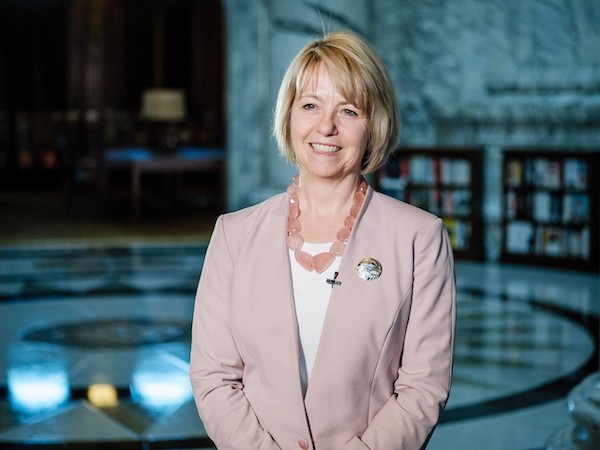Dr. Bonnie Henry will be honoured at Beth Israel’s gala event May 30. (photo from BI)
Dr. Bonnie Henry will be honoured at the 2021 Congregation Beth Israel gala May 30. The provincial health officer for British Columbia will be given the Keter Ha’bri’ut Award at the virtual celebration.
The term keter ha’bri’ut translates to Crown of Health, and the award has been created “to honour those in the community who have worked diligently, relentlessly and with humility for the betterment of their fellow citizens.”
“The truth is that we couldn’t think of anyone better than Bonnie Henry because, the fact is that she’s literally been a keter ha’bri’ut, a crown of health, for our province in helping to keep us healthy,” said Rabbi Jonathan Infeld, senior rabbi at Beth Israel. “She embodies one of the single most important concepts of Jewish tradition, spreading the word of chesed, of kindness. It’s not only that she cares about the physical health of our province, but I think one of the reasons that she has become famous across the country and the world is because she cares about the humanity of our province as well.”
When the synagogue’s gala committee asked Henry if she would be willing to be honoured by the gala and receive an award, about nine months ago, organizers hoped that the event might be in person or, at least, a hybrid event with some people present and others tuning in virtually.
Instead, the main portion of the event will feature words from Henry, Infeld and others, all virtually, with musical entertainment by Maya Rae. At certain ticket levels, food delivery is included and, for major donors, a pre-event will feature a mixology session, with cocktail kits delivered to the homes of virtual attendees. Henry will share a favourite cocktail recipe of her own.
Henry’s commitment to inclusion and her respect for Jewish traditions impressed Infeld from the moment Henry held her first group conference call with clergy from around the province, about the time the pandemic began.
“One of the things that really touched me,” he said, “was in her very first address to the clergy of British Columbia – I’m not talking about the rabbis, but for the clergy of British Columbia – many, many months ago, as we were entering into the COVID era, she said, we are going to have to have fewer faces and bigger spaces and one of the things that that means is we won’t be able to do in-person shivas for awhile.”
Infeld believes that Henry’s time as associate medical officer of health for Toronto Public Health during H1N1 and SARS outbreaks in that metropolis put her in close contact with the Jewish community there.
Henry’s work is serious, as is the award she will receive from Beth Israel, said the rabbi, but parts of the evening’s program will be lighthearted.
The gala is to be emceed by Dr. Isaac Elias, a young member of the synagogue and a medical doctor who helped guide the synagogue’s response to COVID from the beginning.
The event will be relatively short – about an hour – and partial proceeds will be donated to the B.C. Centre for Disease Control.
Infeld said, “It’s an opportunity for us as a community to say thank you to someone who has done so much for the province and for the residents of the province and embodies some of the most important messages of Jewish thought, being that of the importance of saving lives and of the importance of being kind to others.”
While the virtual gala will be an unusual event, Infeld stresses that the shul is no stranger to Zooming. Since the week the pandemic began, he said, the decision was made “to ramp up our programming, not ramp down.”
“We actually have more programming than we have ever had before,” he said. “In the early days of COVID, when everyone was literally shut in, we had teams of volunteers calling and assisting our seniors, we engaged all of our young adults and they were helping deliver food to seniors, helping them with whatever needs they had, technological, food and beyond.
“We also increased our programming. We never had a daily learning [before COVID]. Now, we have a daily mussar class. What used to be a monthly Lunch & Learn became the weekly Zoom & Learn and now is becoming the weekly evening program known as Prime Time BI. A Zoom Scholars series was funded in part by Harley Rothstein and Eleanor Boyle. One of the things that we’ve seen is participation rates in our services online and our online programs are up anywhere from 30 to 100%, and we’ve been able to maintain that.”
Presenting sponsor for the gala event is the Shay (Shy) Keil Group.
“I am thrilled to be the presenting sponsor for this event, both in support of the Beth Israel Congregation and also Dr. Bonnie Henry,” said Keil. “It is an honour to present this award to Dr. Henry for all that she has done during the pandemic, making extraordinarily difficult protocol decisions and becoming the public face of this pandemic. It is a thankless task that she has assumed since March 2020 and I am so happy that Beth Israel has decided to recognize her.”
For tickets to the event, visit bethisrael.ca.

